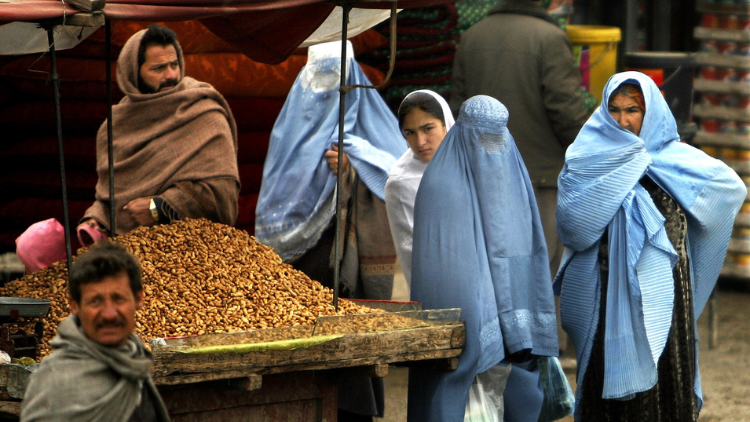Human Rights
Human Rights Situation Under Taliban Regime

Market Place in Afghanistan
© From Pixabay Via Canva ProThe return of the Taliban in Afghanistan and the subsequent dissolution of the pre-existing republic on August 15, 2021, has resulted in a pronounced rollback in the progress made towards protecting human rights and free society values. This has particularly affected the rights of women and at-risk groups, raising serious concerns about the current human rights situation in the country.
Over the last 20 years, Afghanistan made significant achievements in advancing human rights and strong efforts were made to protect freedom of expression, establish democratic institutions, promote gender equality, expand access to education and healthcare, and foster a more inclusive society.
Afghanistan was a good regional example with a thriving media landscape and open exchange of ideas. However, since August 15, 2021, the situation has become uncertain, raising strong concerns about potential human rights violations for activists, former employees involved in government service or with NGOs, women, and minority groups.
The Taliban's Record:
Under their earlier rule in the late 1990s, the Taliban regime enforced a severely restrictive interpretation of Sharia law, greatly curbing individual and collective freedoms. Women and girls suffered egregious treatment, including the deprivation of education, employment, healthcare, and mobility. Public executions, amputations, and floggings quashed dissent and curtailed freedom of expression.
Freedom of Expression:
The current Taliban regime persistently suppresses freedom of expression, stifling independent media outlets and intimidating individuals who dare to express dissenting opinions. Such acts of suppression, including imprisonment and even threats of death, impede the democratic process and the vital exchange of ideas necessary for societal advancement.
Maltreatment of Women and Girls:
The Taliban's approach to girls' education and the treatment of women is deeply alarming. According to UNESCO reports, the current authoritarian regime has denied approximately 1.2 million Afghan girls access to secondary schools and universities.
The International Labour Organization reports a 25% decrease in employment of Afghan women since the Taliban’s return. This unfortunate situation undermines the significant advancements made in women's rights over the past two decades, as the current authorities prohibit females from accessing education and employment.
Rights of Religious and Ethnic Minorities:
Recent surveys by human rights organizations reveal that the Taliban regime has not only shown hostility towards minority groups but has also actively persecuted and displaced them. Minority groups such as Hazaras, Shias, Sikhs, and Hindus in Afghanistan have consistently faced grave threats and frequent attacks. The return of the Taliban has increased these threats, as they have significantly violated the rights of these communities and also the rapid growth of ISKP (The Islamic State of Khorasan Province) within the country is another big challenge.
Humanitarian and Economic Crises:
The current situation in Afghanistan has led to strong humanitarian and economic crises. According to UNICEF, 28.3 million people, including 15.2 million children, require humanitarian assistance, while 17.6 million individuals need healthcare aid. Access to healthcare, clean water, and sufficient food is limited. The freezing of $9.5 billion of Afghan central bank reserves by the United States, the collapse of the banking system, and the absence of international NGOs and companies have led to a significant increase in unemployment, with approximately more than 1 million job losses since the Taliban's return.
Taliban's Approach to Political Parties, Civil Society, and Human Rights:
The Taliban's understanding of political parties, civil society, and human rights is wrong. They believe that these concepts are Western and incompatible with Islam and Afghan traditions. Since their return, they have banned women from working with NGOs, restricted their activities, and dismantled the department responsible for registering civil society organizations and political parties within the Ministry of Justice. This has led to the termination of over 5,000 civil society organizations and 84 political parties. Currently, only around 5,791 NGOs registered with the Ministry of Economy are allowed to operate for humanitarian and educational purposes. However, due to financial limitations and physical threats, 95% of them have been forced to shut down or conduct only online activities from abroad.
The Beacon of Hope:
Following the republic's collapse, there were concerns that international efforts and investments in Afghanistan for freedom and human rights would be completely wasted. But it quickly became evident that the Afghan people have passionately embraced the spirit of freedom and its potential for a peaceful and free society. Each new generation in Afghanistan is an advocate for freedom, and despite the challenges caused by failed politicians, the unwavering determination of the people in their pursuit of a free and independent Afghanistan brings great joy, as it reveals the robust presence of the foundation of freedom in the country.
Conclusion:
The critical human rights situation in Afghanistan demands urgent global attention. International support and condemnation of the Taliban's violations must be unwavering. Their oppression of minorities, women, and freedom of expression cannot be ignored. Monitoring, aid provision, and pressure on the Taliban to uphold human rights standards are vital. The people of Afghanistan deserve a future of dignity, freedom, and peace. Since the conflict in Ukraine, the international community has overlooked Afghanistan, but they must remain committed to addressing violations, supporting justice, and enabling a free society in the nation. Afghanistan should not be forgotten, as it could once again become a safe haven for terrorists, posing a global security threat.
